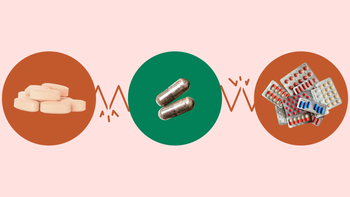
Magnesium: Overview and Benefits
Key takeaways:
Magnesium is a mineral your body needs to function properly. It’s found in many foods and is also available as a dietary supplement.
Taking magnesium supplements may help with migraine prevention, but it’s not clear how well it helps with other health conditions.
Unless your healthcare provider has said otherwise, you probably don’t need to take a magnesium supplement — especially if you eat a wide variety of nutritious foods.
Access savings on related medications
Table of contents

What is magnesium?
Magnesium is a mineral that is vital for your health. It’s one of the most important minerals that your body uses. Your body can’t make magnesium on its own, so you need to get it from an outside source — like food. Once it’s in your body, your kidneys help control the amount of magnesium circulating in your blood.
Magnesium has many different jobs in your body, including:
Helping your nerves and muscles work well
Keeping your immune system strong
Maintaining a regular, steady heartbeat
Regulating your blood pressure
Building strong bones
Controlling your blood sugar
Making energy and protein
Making DNA
Search and compare options
What are the health benefits of taking magnesium supplements?
Researchers are still learning about magnesium and health. There’s some evidence that consuming higher amounts of magnesium might help prevent or treat:
Migraine headaches: Research has shown that magnesium may help with migraines. Both the American Headache Society and the American Academy of Neurology recommend magnesium as a way to possibly prevent migraine headaches.
High blood pressure: High blood pressure can put you at risk for many health problems, including stroke and heart disease. In some studies, taking magnesium supplements lowered blood pressure a small amount. It may also reduce the risk of stroke.
Type 2 diabetes: Studies have also shown promise for taking magnesium to decrease the risk of Type 2 diabetes, and others have shown that it may help with glycemic control in people with Type 2 diabetes. But at this point, the American Diabetes Association says there’s not enough evidence to recommend magnesium for people with diabetes.
Osteoporosis: Higher magnesium intake is linked to strong bones, which may reduce the risk of osteoporosis and fractures. More research is needed to understand how magnesium might help prevent or treat osteoporosis.
Anxiety and depression: Magnesium helps to regulate neurotransmitters like serotonin and GABA. There’s some evidence that low magnesium is linked to both anxiety and depression. But it’s not clear yet whether or not taking magnesium can help with these conditions.
Women’s health: There’s some evidence that magnesium is helpful for women with premenstrual syndrome (PMS), polycystic ovary syndrome (PCOS), and menopause symptoms. But more research is needed before we can know for sure.
And keep in mind: Even though magnesium is important, magnesium supplements are not recommended by the National Institutes of Health (NIH) for most people — unless your healthcare provider specifically recommends that you take them.
Magnesium: Sources and supplements
You can get magnesium from three different sources:
Food
Dietary supplements
Certain over-the-counter medications
It’s best to get all of the magnesium you need by eating nutrient-rich foods. Not only are nutritious foods a great way to get magnesium, but they also contain vitamins, fiber, and other healthy minerals.
Read more like this
Explore these related articles, suggested for readers like you.
Foods that are high in magnesium include:
Nuts
Seeds
Beans
Lentils
Soybeans
Tofu
Dark, leafy greens
Whole grains
Fortified breakfast cereals
Milk
Yogurt
Dark chocolate
If you can’t get enough magnesium from foods, your healthcare provider might recommend a magnesium supplement. Magnesium supplements are available as pills, chewable tablets, liquids, or dissolvable powders. Magnesium is also in many multivitamins.
What type of magnesium should you take?
Most people get enough magnesium from food. But if your healthcare provider has suggested you take a magnesium supplement, there are several different types. The ones most easily absorbed by your body are:
Magnesium aspartate: This is a combination of magnesium and aspartic acid (an amino acid). It’s one of the easiest types of magnesium for your body to absorb.
Magnesium citrate: This is a combination of magnesium and citric acid. It has a strong laxative effect and is sometimes used to treat constipation.
Magnesium lactate: This is a combination of magnesium and lactic acid.
Magnesium chloride: This is a combination of magnesium and hydrochloric acid.
Dissolvable powders are completely absorbed in your gut, while other forms of magnesium are not.
Magnesium supplement dosing
Your daily recommended amount of magnesium depends on your age and sex. Typical doses are listed in the table below.
Age group | Magnesium dose (mg) |
|---|---|
Children age 1 to 3 | 80 mg |
Children age 4 to 8 | 130 mg |
Children age 9 to 13 | 240 mg |
Female teens age 14 to 18 | 360 mg |
Male teens age 14 to 18 | 410 mg |
Female adults age 19 to 30 | 310 mg |
Male adults age 19 to 30 | 400 mg |
Female adults age 31 and older | 320 mg |
Male adults age 31 and older | 420 mg |
Also, keep in mind: If you’re taking magnesium supplements, make sure that you don’t go above the recommended daily maximum.
The daily maximums for magnesium supplements are listed below.
Age group | Magnesium dose (mg) |
|---|---|
Children ages 1 to 3 | 65 mg |
Children age 4 to 8 | 110 mg |
Children age 9 to 18 | 350 mg |
Adults | 350 mg |
Notice that these daily maximums are less than the total recommended daily amount. That’s because most people who take a magnesium supplement also get magnesium from the food they eat.
The magnesium doses used for migraines are usually above the recommended daily maximum of 350 mg for adults.
Should I take a magnesium supplement?
Probably not. Most people get all the magnesium they need from food. But in some cases, your healthcare provider might recommend a dietary supplement if your magnesium levels are too low.
Low magnesium levels are more common in people who:
Are older
Have inflammatory bowel disease
Have had part of their intestines surgically removed
Are on a gluten-free diet
Have Type 2 diabetes
Drink a lot of alcohol
Take certain medications
Magnesium supplement interactions
Magnesium supplements can potentially affect how your body absorbs certain medications when you take them around the same time. Your healthcare provider may advise you to separate your magnesium and medication doses by a few hours to avoid this interaction.
Examples of these medications include:
Bisphosphonates like alendronate (Fosamax)
Tetracycline antibiotics like doxycycline (Vibramycin)
Fluoroquinolone antibiotics like ciprofloxacin (Cipro)
Certain medications can affect magnesium levels in your body. If you’re taking any of these medications long term, your healthcare provider may want to monitor your levels.
Examples include:
Diuretics (water pills) like furosemide (Lasix), hydrochlorothiazide (Microzide), and amiloride (Midamor)
Spironolactone (Aldactone)
Proton pump inhibitors (PPIs) like omeprazole (Prilosec)
The examples listed above do not include all potential interactions with magnesium.
Magnesium supplement side effects
Most commonly, high doses of magnesium supplements can cause diarrhea. In fact, magnesium-containing laxatives (such as milk of magnesia) use this effect to help with constipation. Nausea and abdominal cramping can also happen with higher doses.
If your recommended dose is causing these side effects and they become bothersome, talk to your healthcare provider or pharmacist.
Safety of magnesium supplements
Magnesium toxicity can happen if you’re taking very large doses of magnesium. This is when the magnesium levels in your blood are too high. High magnesium levels may be more likely if you have kidney problems. As mentioned above, your kidneys help remove extra magnesium from your body.
Early symptoms of high magnesium levels can include:
Dizzy or lightheaded feeling (sign of low blood pressure)
Flushed skin
Nausea
Vomiting
Difficulty urinating
Fatigue
If you’re experiencing any of these symptoms, contact your healthcare provider right away.
The symptoms listed above can progress into more serious ones, including:
Difficulty breathing
Muscle weakness
Feeling like you’re going to pass out
Fast or irregular heartbeat
If you’re experiencing any of these symptoms, get immediate medical attention. In some cases, they can progress to cardiac arrest (when your heart suddenly stops beating).
FAQs
Yes. In fact, magnesium is needed to activate vitamin D in your body. If you’re considering taking both vitamin D and magnesium, talk to your healthcare provider about how they work together. Remember: Both vitamin D and magnesium can have different side effects and can interfere with other medications you may be taking.
According to the NIH, you should not take magnesium supplements every day — unless specifically directed to do so by your healthcare provider. It’s best to get all the magnesium you need through food and beverages.
It’s not clear. So far, most of the studies on sleep and magnesium have had mixed results — including research on restless leg syndrome. If you’re having trouble sleeping, talk to your healthcare provider about whether magnesium might be right for you. They can also help you understand other strategies for getting good sleep, like therapy, medications, and lifestyle changes.
Disclaimer: The FDA does not test supplements for safety and effectiveness. Supplements can contain harmful substances. They can also affect how your medications work. Always speak with your healthcare provider before taking any supplement.
Why trust our experts?



References
American Academy of Neurology. (2012). New guidelines on treating migraine press kit.
American Migraine Foundation. (2021). Magnesium and migraine.
Boyle, N. B., et al. (2017). The effects of magnesium supplementation on subjective anxiety and stress—A systematic review. Nutrients.
Evert, A. B., et al. (2013). Nutrition therapy recommendations for the management of adults with diabetes. Diabetes Care.
Fiorentini, D., et al. (2021). Magnesium: Biochemistry, nutrition, detection, and social impact of diseases linked to its deficiency. Nutrients.
Hindiyeh, N. (n.d.). How do I help my patient choose the right preventive treatment?
Larsson, S. C., et al. (2012). Dietary magnesium intake and risk of stroke: A meta-analysis of prospective studies. The American Journal of Clinical Nutrition.
Marshall, N. S., et al. (2019). Magnesium supplementation for the treatment of restless legs syndrome and periodic limb movement disorder: A systematic review. Sleep Medicine Reviews.
MedlinePlus. (n.d.). Magnesium in diet.
MedlinePlus. (2023). Aspartic acid.
Młyniec, K., et al. (2014). Essential elements in depression and anxiety. Part I. Pharmacological Reports.
National Center for Complementary and Integrative Health. (2023). Vitamins and minerals.
National Institutes of Health, Office of Dietary Supplements. (2020). Magnesium fact sheet for consumers.
National Institutes of Health, Office of Dietary Supplements. (2022). Magnesium - Fact sheet for health professionals.
O’Conner, A. (2021). Can magnesium supplements really help you sleep? The New York Times.
Porri, D., et al. (2021). Effect of magnesium supplementation on women's health and well-being. Nutrition and Food Science Journal.
PubChem. (n.d.). Magnesium aspartate tetrahydrate. U.S. National Library of Medicine.
PubChem. (n.d.). Magnesium chloride. U.S. National Library of Medicine.
PubChem. (n.d.). Magnesium lactate. U.S. National Library of Medicine.
U.S. Department of Agriculture and U.S. Department of Health and Human Services. (2020). Dietary guidelines for Americans, 2020 - 2025.
U.S. Department of Agriculture. (2018). Abridged list ordered by nutrient content in household measure.
U.S. Food and Drug Administration. (2022). Questions and answers on dietary supplements.
Uwitonze, A. et al. (2018). Role of magnesium in vitamin D activation and function. Journal of Osteopathic Medicine.
Welch, A. A., et al. (2017). Dietary magnesium may be protective for aging of bone and skeletal muscle in middle and younger older age men and women: Cross-sectional findings from the UK Biobank Cohort. Nutrients.





























